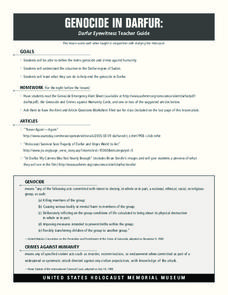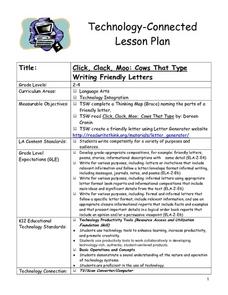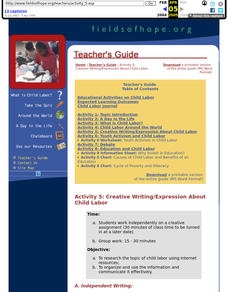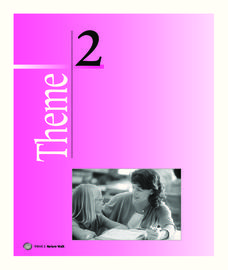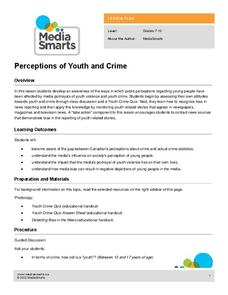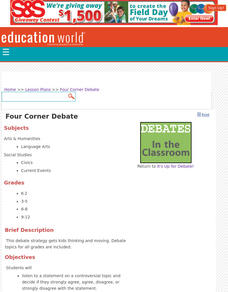Curated OER
Deformed Frogs! - The Parasite Hypothesis
This project provides young scholars the opportunity to investigate parasites as a possible cause of the observed frog deformities. It asks students to view web-based evidence and interpret whether it supports the parasite hypothesis....
US Holocaust Museum
Genocide in Darfur: Darfur Eyewitness Teacher Guide
The events of the Holocaust in World War II would never happen again, right? Scholars research the current genocide taking place in Darfur. Using video and Holocaust Reading Passages, they analyze the horror of this forgotten part of the...
Curated OER
Diversity in Media: Looking Critically at What We See
This learning experience fosters awareness of representations we see, and don't see, in the media. Learners list TV programs, games, and films they enjoy, identify characters' ethnic, religious, (dis)ability, and sexual orientation...
Curated OER
Creative Writing
Eleventh graders write a persuasive letter to the editor using the writing process.
Curated OER
The Gentle Art of Persuasion: Techniques for Persuading Different Audiences
Students examine the use of persuasive arguments to varying audiences. They define persuasion, read and discuss an article on whether P.E. should be optional, summarize the pros and cons of P.E., and write a letter or a speech.
Curated OER
Separate But Equal Opinions
High schoolers examine the ways in which editorials and Op-Ed pieces respond to current events. They write editorials in response to news items from the New York Times.
Curated OER
Do the Write Thing
High schoolers take stands on issues that matter to them. For this philanthropy lesson, students read Anne Frank: The Diary of a Young Girl, discuss the act of advocating for others, and write letters of support for issues they belive in...
National History Day
“Saving the Bear”: The Russian Expeditionary Force of World War One
How have Russian politics affected countries on a global stage? The discussion of the Russian Revolution and World War I begins with an analysis of primary resource letters. Learners finish with a project where they create a timeline of...
Curated OER
Cows That Type Friendly Letters
Students engage in a lesson that introduces the parts of a letter. The lesson is taught using a powerpoint presentation with the purpose of integrating technology into instruction. Students create a letter and thinking map to challenge...
Curated OER
Activity 5: Creative Writing/Expression About Child Labor
Young scholars research child labor using Internet resources. They present the information in a creative writing piece and post it on Chalkboard.
Constitutional Rights Foundation
Options for Affecting Public Policy
Letter-writing, e-mail and telephone campaigns, petitions, marches, meetings, with lawmakers. Options for influencing elected representatives are the focus of resource that details how to craft each of these approaches to influencing...
US National Archives
Eastern Europe 1939-45 — Ukraine
Was Joseph Stalin desperate or exaggerating the USSR's need for assistance on the Eastern Front in 1942? History students examine two differing opinions on Stalin's position and the reality of the Eastern Front just three years before...
EngageNY
Author’s Read: Final Performance Task
Scholars submit their final performance task, a letter to a publisher about an athlete's legacy. As a culminating activity, they share their work with classmates in small groups.
Jackson Public Schools
Summer Reading Activities
Provide parents with the tools they need to bridge the summer learning gap with this collection of fun activities. Whether it's creating an alphabet poster with illustrations for each letter, playing a game of sight word concentration,...
Orlando Shakes
The Taming of the Shrew: Study Guide
William Shakespeare's The Taming of the Shrew combines three things that are sure to capture scholars' attention: love, deception, and clown attire. With the curriculum guide, learners hone their opinion-writing skills and practice...
Houghton Mifflin Harcourt
Nature Walk: Extra Support Lessons (Theme 2)
Reinforce concepts such as long vowels, spelling patterns, sound clusters, double-final consonants, and syllables with a nature-themed unit. Through a series of extra support lessons, learners compare and contrast using a Venn diagram,...
University of Delaware
Constructing Text-Based Arguments About Social Issues
Eighth graders take a stand on a variety of controversial topics with a lesson on argumentative writing. As they view an informative presentation and work with collaborative groups, they decide which side of each argument they want to...
Media Smarts
Perceptions of Youth and Crime
Explore the potential for bias in the news and in scholars' own attitudes and opinions. Begin with a quiz on youth crime to see how learners perceive crime among their peers. After looking at the correct answers, put individuals in...
Curated OER
Who Has the Power?
Fifth graders write persuasive letters expressing opinions about the purchase of 25 acres adjacent to Wakulla Springs proposed to include a convenience store/gas station. They submit the letter to the Florida Department of Environmental...
Curated OER
Four Corners Debate
Should the student population wear uniforms to school? Pupils express whether they strongly agree, agree, disagree, or strongly disagree with a controversial statement, moving to a designated corner of the room to indicate their stance....
Curated OER
Understanding and Using Primary and Secondary Sources in History
Explore primary and secondary sources in this historical analysis lesson. Young researchers define the terms primary source and secondary source. They read a primary source document provided by the teacher and answer questions about the...
Curated OER
Search Warranted?
Young readers work on evaluating claims in a piece of informational text with the article "In New York, It's Open Bag or Find Exits" from the New York Times. They analyze current search procedures implemented to fight terrorism and...
Chicago Historical Society
Are We the People?
Taking on the roles of a fiery Boston patriot, a Philadelphia merchant's wife, and a prominent abolitionist, your young historians will consider the reactions of these early Americans to the creation of the Declaration of Independence,...
C-SPAN
Electoral College Pros/Cons and Alternatives
If every vote counts, why do we need the electoral college? Middle and high schoolers study the Constitutional precedent of the electoral college, as well as its place in historical and modern elections, with an engaging social studies...



